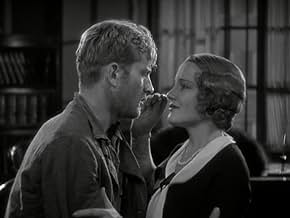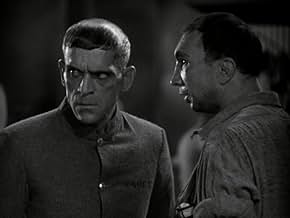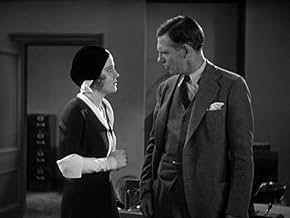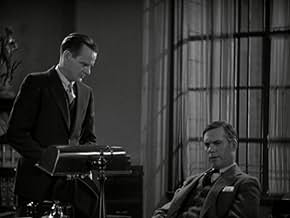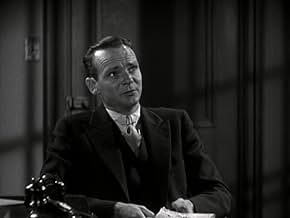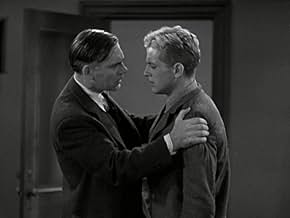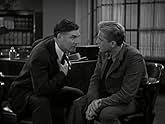AVALIAÇÃO DA IMDb
6,9/10
1,5 mil
SUA AVALIAÇÃO
Adicionar um enredo no seu idiomaAfter a failed attempt at running for governor, D.A. Mark Brady is appointed warden of the state prison where many of the criminals he prosecuted are incarcerated.After a failed attempt at running for governor, D.A. Mark Brady is appointed warden of the state prison where many of the criminals he prosecuted are incarcerated.After a failed attempt at running for governor, D.A. Mark Brady is appointed warden of the state prison where many of the criminals he prosecuted are incarcerated.
- Direção
- Roteiristas
- Artistas
- Indicado a 1 Oscar
- 3 vitórias e 1 indicação no total
DeWitt Jennings
- Captain Gleason
- (as De Witt Jennings)
Paul Porcasi
- Tony Spelvin
- (as Paul Porcassi)
Richard Bishop
- Minor Role
- (não creditado)
Andy Devine
- Cluck - a Convict with knife
- (não creditado)
James Guilfoyle
- Detective Doran
- (não creditado)
Frank Hagney
- Prison Guard in Yard
- (não confirmado)
- (não creditado)
- Direção
- Roteiristas
- Elenco e equipe completos
- Produção, bilheteria e muito mais no IMDbPro
Avaliações em destaque
Twenty year-old Robert Graham (Phillips Holmes) accidentally kills another man in a drunken brawl. District Attorney Mark Brady (Walter Huston) has to prosecute the young man, despite feeling sympathetic towards him. Graham is convicted to ten years in the state penitentiary. Six years later, D.A. Brady has been appointed warden of the prison and is appalled at what prison life has done to Graham. With help from his daughter (Constance Cummings), who falls in love with Graham, Brady gets the young man back on the right track. But all of it may come to naught when another prisoner is murdered and Graham is forced to choose between snitching and keeping quiet.
Phillips Holmes is not a name that most people, including myself, are familiar with. He retired from acting in 1938 and died in a mid-air collision in Canada four years later. This is probably his most well-known role and that's not saying much since this is hardly a well-known film. But he does a terrific job. Expectedly good performance from Walter Huston, arguably Hollywood's best actor in the early talkies. Also features Boris Karloff in one of his best pre-Frankenstein roles as a vengeful inmate who hates squealers.
Great early Howard Hawks crime drama. Nice Hawksian banter and overlapping dialogue, particularly in the early scenes with reporters. Remade twice, as Penitentiary in 1938 and Convicted in 1950. A must-see for fans of Hawks, Huston, and Karloff.
Phillips Holmes is not a name that most people, including myself, are familiar with. He retired from acting in 1938 and died in a mid-air collision in Canada four years later. This is probably his most well-known role and that's not saying much since this is hardly a well-known film. But he does a terrific job. Expectedly good performance from Walter Huston, arguably Hollywood's best actor in the early talkies. Also features Boris Karloff in one of his best pre-Frankenstein roles as a vengeful inmate who hates squealers.
Great early Howard Hawks crime drama. Nice Hawksian banter and overlapping dialogue, particularly in the early scenes with reporters. Remade twice, as Penitentiary in 1938 and Convicted in 1950. A must-see for fans of Hawks, Huston, and Karloff.
"The Criminal Code" is centered around the theme "An Eye for An Eye." This theme is the reason that young Robert Graham is sent to prison, the reason why the prisoners object to the D.A. becoming the Warden of the prison, and the reason why Graham is sent to "the hole" near the end of the film. For 1931, it was one of the first critical looks at this theme. It raises certain questions as to the morals of the law, and the Criminal Code versus the Prisoners Code. Phillips Holmes gives a good enough performance as Robert Graham, and Boris Karloff came off well as the inmate with a bone to pick (months before becoming Frankenstein), but the performance that I liked the most was Walter Huston, who played the D.A.-turned-prison-warden. Huston's character was a wily one, who said "Yeah" and "Yeah?" about a hundred times throughout the film.
I would say it is THE best except for my fondness for "Caged." This is a brilliant movie, as shocking as Hawks's "Scarface," released a year later and far better known.
Walter Huston is a district attorney when we met him. Throughout, he is given to the one word, catchall statement or response "Yeah." Huston has rarely if ever been better -- and he was one of the greats of Hollywood history.
Phillips Holmes is excellent as a young man he sends to prison. He is innocent in all senses before he gets there. But he quickly leans the code of the title.
Constance Cummins isn't given much as Huston's daughter but she is appealing. However, Boris Karloff gives one of his very finest performances as a tough but decent prisoner. Of course, of course he is fine in "Frankenstein." And he is wildly brilliant in "Lured" many years later. Here he gives a solid, unadorned, moving performance.
Clark Marshall, a name I do not recognize, is also fine. He plays a sniveling, conniving inmate. And DeWitt Jennings is shocking as a brutal guard.
Amazingly, I had never seen this movie before tonight. It's bone I will want to see again; and I urge you to see it, too.
Walter Huston is a district attorney when we met him. Throughout, he is given to the one word, catchall statement or response "Yeah." Huston has rarely if ever been better -- and he was one of the greats of Hollywood history.
Phillips Holmes is excellent as a young man he sends to prison. He is innocent in all senses before he gets there. But he quickly leans the code of the title.
Constance Cummins isn't given much as Huston's daughter but she is appealing. However, Boris Karloff gives one of his very finest performances as a tough but decent prisoner. Of course, of course he is fine in "Frankenstein." And he is wildly brilliant in "Lured" many years later. Here he gives a solid, unadorned, moving performance.
Clark Marshall, a name I do not recognize, is also fine. He plays a sniveling, conniving inmate. And DeWitt Jennings is shocking as a brutal guard.
Amazingly, I had never seen this movie before tonight. It's bone I will want to see again; and I urge you to see it, too.
The Criminal Code (1931) is often passed over when it comes to discussion of the films of Howard Hawks, but it's actually one of my favorites from him.
There are a lot of stagey aspects to be sure and the central love story is pretty boring, but there's just so much to love. The film experiments with sound, overlapping dialogue and using crowd noise as a plot element.
The two standout actors are Walter Huston and a pre-stardom Boris Karloff. Anytime either of them walks on screen, everyone else just evaporates. Huston does a great job making the audience love and despise his character. And Karloff is just mesmerizing as Galloway, a convict hell-bent on vengeance.
No masterpiece, but it is an early sign of Hawks' genius. And I would take it over Bringing Up Baby (1938) and His Girl Friday (1940) any day of the week.
There are a lot of stagey aspects to be sure and the central love story is pretty boring, but there's just so much to love. The film experiments with sound, overlapping dialogue and using crowd noise as a plot element.
The two standout actors are Walter Huston and a pre-stardom Boris Karloff. Anytime either of them walks on screen, everyone else just evaporates. Huston does a great job making the audience love and despise his character. And Karloff is just mesmerizing as Galloway, a convict hell-bent on vengeance.
No masterpiece, but it is an early sign of Hawks' genius. And I would take it over Bringing Up Baby (1938) and His Girl Friday (1940) any day of the week.
DA Brady sends young Graham to prison unjustly, and must redeem himself once he becomes the prison's warden.
The credits indicate icon Howard Hawks as the director; IMDb uncharacteristically lists no one; while Hawks' bio-site states he's the uncredited helmsman. I include this rather puzzling movie pedigree because I see very little of Hawks' characteristic style on screen. He may well have been adjusting to the new factor of sound (as others point out), but whatever the reason, the screenplay could have been filmed by any number of solid Hollywood craftsmen.
The movie itself has been made several times over, so the material is familiar. But except for Huston's dynamic performance and Karloff's formidable presence, there's not much to recommend beyond the story itself. The prison yard scenes are riveting with their marching phalanxes of inmates. Sort of like a non-musical Busby Berkeley. I also like that early scene where DA Brady (Huston) strips away shady lady Gertie's thin façade of respectability. To me, its spirited air bespeaks Hawks' guiding hand, as does Brady's surprisingly intense grilling of Graham. However, what should be a highlight, Ned's (Karloff) revenge killing of the squealer, is unnecessarily down-played for this pre-Code period.
Note how we're led to respect the inmates' code of conduct even though they are convicted criminals. Both the law and the inmates have their respective codes, but more importantly, the codes may well be linked by a common sense of justice. When, for example, those codes are broken by the squealer, on one hand, and by head guard Gleason, on the other, we're led to sympathize with the respective acts of retribution, bloody though they undoubtedly are. And since both acts are carried out by the hulking Ned, he becomes something of an avenging angel despite his gruesome appearance. It's the ambiguities of the two codes, united, perhaps, by a common sense of justice that suggests an interesting subtext to the story.
Anyway, in my little book, this is a Walter Huston showcase, proving again that an actor of less than handsome appearance could carry a Hollywood movie.
The credits indicate icon Howard Hawks as the director; IMDb uncharacteristically lists no one; while Hawks' bio-site states he's the uncredited helmsman. I include this rather puzzling movie pedigree because I see very little of Hawks' characteristic style on screen. He may well have been adjusting to the new factor of sound (as others point out), but whatever the reason, the screenplay could have been filmed by any number of solid Hollywood craftsmen.
The movie itself has been made several times over, so the material is familiar. But except for Huston's dynamic performance and Karloff's formidable presence, there's not much to recommend beyond the story itself. The prison yard scenes are riveting with their marching phalanxes of inmates. Sort of like a non-musical Busby Berkeley. I also like that early scene where DA Brady (Huston) strips away shady lady Gertie's thin façade of respectability. To me, its spirited air bespeaks Hawks' guiding hand, as does Brady's surprisingly intense grilling of Graham. However, what should be a highlight, Ned's (Karloff) revenge killing of the squealer, is unnecessarily down-played for this pre-Code period.
Note how we're led to respect the inmates' code of conduct even though they are convicted criminals. Both the law and the inmates have their respective codes, but more importantly, the codes may well be linked by a common sense of justice. When, for example, those codes are broken by the squealer, on one hand, and by head guard Gleason, on the other, we're led to sympathize with the respective acts of retribution, bloody though they undoubtedly are. And since both acts are carried out by the hulking Ned, he becomes something of an avenging angel despite his gruesome appearance. It's the ambiguities of the two codes, united, perhaps, by a common sense of justice that suggests an interesting subtext to the story.
Anyway, in my little book, this is a Walter Huston showcase, proving again that an actor of less than handsome appearance could carry a Hollywood movie.
Você sabia?
- CuriosidadesThe prison yard sequence was shot at M-G-M, using the set originally built for "The Big House" (1930).
- Erros de gravaçãoPaul Porcasi's name is spelled "Porcassi" in the opening credits.
- Citações
Mark Brady: [to Graham] Tough luck, Bob, but that's the way they break sometimes. You got to take them the way they fall.
- Cenas durante ou pós-créditosThe film's credits do not say that Howard Hawks directed the film; instead, they say that the film is "A Howard Hawks Production."
- ConexõesAlternate-language version of El código penal (1931)
Principais escolhas
Faça login para avaliar e ver a lista de recomendações personalizadas
- How long is The Criminal Code?Fornecido pela Alexa
- Why was Howard Hawks uncredited as director?
Detalhes
- Data de lançamento
- País de origem
- Idioma
- Também conhecido como
- The Criminal Code
- Locações de filme
- Empresa de produção
- Consulte mais créditos da empresa na IMDbPro
- Tempo de duração1 hora 37 minutos
- Cor
Contribua para esta página
Sugerir uma alteração ou adicionar conteúdo ausente

Principal brecha
By what name was O Código Penal (1931) officially released in Canada in English?
Responda
